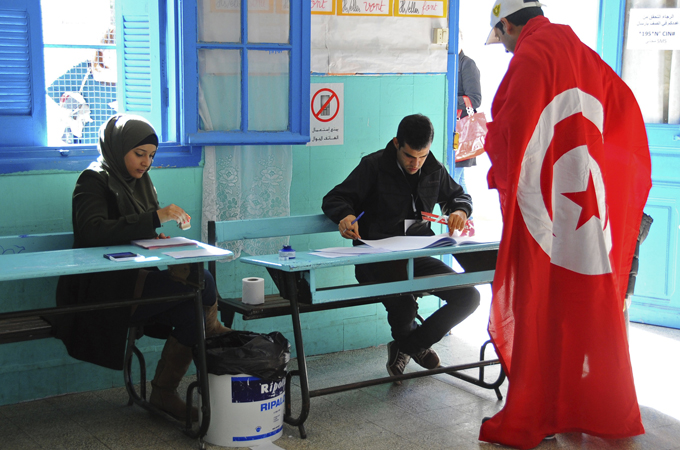
Preliminary official results have still to be released by election authorities [AP]
|
||
| Polls have closed in Tunisia’s elections, the third in the last two months in which an official from the country’s previous regimes and a veteran human rights activist are vying for the presidency.
The runoff on Sunday between 88-year-old Beji Caid Essebsi, leader of the Nidaa Tounes party, and incumbent Moncef Marzouki, represents the final stage in Tunisia’s democratic transition since popular uprisings overthrew long-ruling President Zine El Abidine Ben Ali. The landmark second-round vote sets Tunisia apart from the turmoil of other Arab countries that went through the uprisings that started in 2011. An hour before polls closed, election officials reported a turnout of 48 percent, suggesting voter fatigue in a country with around 5.3 million registered voters. . Turnout in the previous two contests was just under 70 percent of registered voters. Essebsi’s campaign claimed victory on Sunday night by a clear margin over rival Marzouki. “I dedicate my victory to the martyrs of Tunisia. I thank Marzouki, and now we should work together without excluding anyone,” Essebsi, a former parliament speaker under Ben Ali, told local television. However, rival campaign manager for Marzouki, Adnen Monsar, dismissed the claims saying it was a very close call. “Nothing is confirmed so far,” Monsar told reporters.
Preliminary official results have still to be released by election authorities. The election was held amid tight security and the closure of main border posts with strife-torn neighbour Libya and is considered Tunisia’s first free presidential election since independence from France in 1956. “This election doesn’t interest me,” said a young man sitting in a crowded cafe in front of a polling station in the capital Tunis’ lower income neighbourhood of Yasmina. “I voted before, but I feel the candidates lie. They promise to create jobs for the youth and improve living conditions, but they don’t keep them.” Essebsi is being considered the favorite to win after taking 39 percent of the vote in last month’s first round and he has promised to restore the “prestige of the state” after the chaotic first years following the revolution marked by unrest and economic problems. “I voted for Beji Essesbi, because he has a lot of experience, and we have a lot of faith in him that he will fix the country,” one supporter told Al Jazeera. Marzouki, who took 33 percent of the vote last month, has warned that Essebsi, whose party also won October’s parliamentary election, will bring back the authoritarian policies of the previous regimes. Supporters of Marzouki, however, are saying they are voting for him inorder to ensure a political power-share within the country. “The reason I voted for Marzouki is because I want to ensure that no single party has all the power,” one supporter told Al Jazeera. Tunisia’s moderate Islamists, who still have a great deal of backing in the country, have not officially backed either candidate, but are believed to lean towards Marzouki. The eve of the election was marked by violence with a shotgun blast wounding a soldier near the city of Kairouan. In a video posted online on Wednesday night, armed men who claimed the 2013 murder of two secular politicians warned further killings of politicians and security forces. According to authorities, around 100,000 police and soldiers secured the polls, and certain stations in the border regions with Algeria were closed earlier than expected due to security reasons.
FRENCH VERSION |
L’eaux de ruissellement dimanche entre 88 ans Beji Caid Essebsi,chef du parti Nidaa Tounes et titulaires de Moncef Marzouki,représente l’ultime étape de la transition démocratique de laTunisie depuis les soulèvements populaires ont renversé long-au pouvoir le Président Zine El Abidine Ben Ali.
Le vote du second tour historique définit Tunisie en dehors del’agitation des autres pays arabes qui ont traversé lessoulèvements qui a commencé en 2011.
Une heure avant la fermeture de bureaux de scrutin, scrutateurs a signalé un taux de participation de 48 %, suggérant la fatigue desélecteurs dans un pays avec environ 5,3 millions d’électeursinscrits. . Taux de participation dans les deux concours précédentsétait un peu moins 70 pour cent des électeurs inscrits.
Campagne de Essebsi a crié victoire dimanche soir, par une margenette sur rival Marzouki. “Je dédie ma victoire aux martyrs de laTunisie. Je remercie Marzouki, et maintenant nous devrionstravailler ensemble, sans exclure personne,”Essebsi, unconférencier de l’ancien Parlement sous Ben Ali, a déclaré à latélévision locale.
Toutefois, le directeur de campagne rivales Marzouki, AdnenMonsar, a rejeté les demandes disant que c’était un appel declôture très. « Rien n’est confirmé jusqu’à présent, » Monsar a déclaré aux journalistes.
Jamal ElShayyal de Jazeera déclaration de Tunis :
Il y a peut-être aussi un sentiment de peur en ce qui concerne lasituation de sécurité après [un] vidéo ISIL qui a été publié plus tôtqui a menacer les gens ne pas pour participer à l’élection etmenaçant d’attaquer les institutions, même si le gouvernement aessayé de leur mieux pour sécuriser les bureaux de vote etd’envoyer des milliers de soldats [du pays].
Les résultats officiels préliminaires doivent encore être libérés parles autorités électorales.
L’élection se déroule au milieu du niveau de sécurité élevé et lafermeture de la frontière principale postes avec voisin déchiréLibye et est considéré comme élection présidentielle libre premièrede la Tunisie depuis l’indépendance de la France en 1956.
“Cette élection ne m’intéresse pas,” a déclaré un jeune hommeassis dans un café bondé devant un bureau de scrutin dans lacapitale quartier de revenu inférieur Tunis’ de Yasmina.
“J’ai voté avant, mais je me sens les candidats se trouvent. Ilspromettent de créer des emplois pour les jeunes et d’améliorer lesconditions de vie, mais ils ne tiennent pas eux.”
Essebsi est étant considéré comme le favori pour gagner après avoir pris 39 % des voix au premier tour le mois dernier et il apromis de restaurer le prestige”de l’Etat ” après la chaotiquepremières années suivant la révolution marquée par des troubleset des problèmes économiques.


